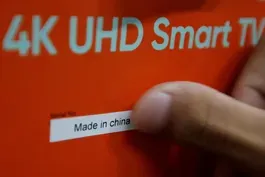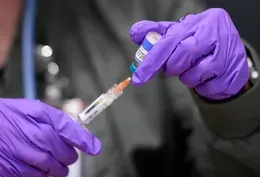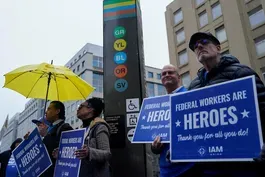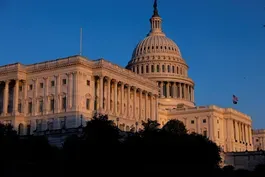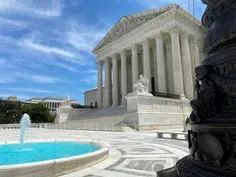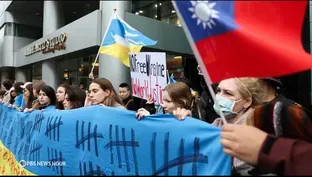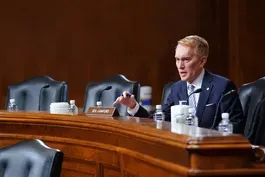
Conditions in the prison where deported migrants are held
Clip: 4/8/2025 | 5m 1sVideo has Closed Captions
The conditions inside the infamous El Salvador prison where deported migrants are held
The U.S. has sent hundreds of people to the notorious mega-prison in El Salvador known as CECOT. William Brangham discussed conditions inside that facility with Nnoah Bullock, the executive director of Cristosal, an international human rights group based in El Salvador.
Problems with Closed Captions? Closed Captioning Feedback
Problems with Closed Captions? Closed Captioning Feedback
Major corporate funding for the PBS News Hour is provided by BDO, BNSF, Consumer Cellular, American Cruise Lines, and Raymond James. Funding for the PBS NewsHour Weekend is provided by...

Conditions in the prison where deported migrants are held
Clip: 4/8/2025 | 5m 1sVideo has Closed Captions
The U.S. has sent hundreds of people to the notorious mega-prison in El Salvador known as CECOT. William Brangham discussed conditions inside that facility with Nnoah Bullock, the executive director of Cristosal, an international human rights group based in El Salvador.
Problems with Closed Captions? Closed Captioning Feedback
How to Watch PBS News Hour
PBS News Hour is available to stream on pbs.org and the free PBS App, available on iPhone, Apple TV, Android TV, Android smartphones, Amazon Fire TV, Amazon Fire Tablet, Roku, Samsung Smart TV, and Vizio.
Providing Support for PBS.org
Learn Moreabout PBS online sponsorshipWILLIAM BRANGHAM: So, apart from those legal fights, the fact remains that the U.S. has sent hundreds of people to the notorious mega-prison in El Salvador known as CECOT.
For more on the conditions inside that facility, we turn to Noah Bullock.
He's the executive director of Cristosal, which is an international human rights group based in El Salvador.
Noah Bullock, thank you so much for being here.
Who are the prisoners held in CECOT.
And how does that compare to other prisons in the country?
NOAH BULLOCK, Executive Director, Cristosal: Yes, thank you, William, for the opportunity.
The CECOT prison has become sort of the public face of President Bukele's security strategy, which is understood as a state of exception.
And the prisoners that are often depicted in those photos are prisoners who have literally the names of the gangs that they belong to tattooed on their face.
For people who watch El Salvador, it's evident that those are the profiles of people, older gang members, who have likely been in prison with sentences for a long time.
It's to say that these types of prisoners have been -- were in other prisons and then were likely transferred to the CECOT once it was constructed.
That's different from what we have documented in the state -- in our monitoring of the state of exception.
There have been 85,000 Salvadorans that have been detained under this emergency declaration, and they are being held in older maximum-security prisons.
And according to our investigations, those prisons may even have more adverse conditions than the ones that are depicted in the CECOT.
We have documented systematic physical beatings, torture, intentional denial of access to food, water, clothing, health care.
And the combination of both the physical abuse and the denial of basic needs has led to the death of at least 368 people, according to our investigations.
WILLIAM BRANGHAM: So is that comparison that you're making implying that CECOT is a better prison as far as -- I mean, because we saw the U.S. homeland security secretary, Kristi Noem, there with a lot of those prisoners standing behind her.
And the -- it seemed that the emphasis she was trying to make is that this is the toughest of the tough and you don't want to get sent here.
So are the conditions in that prison better?
NOAH BULLOCK: Yes, the CECOT has definitely been presented as the model of how strongmen should deal with the worst of the worst.
And there's no doubt that there's an implicit cruelty and dehumanization in the treatment of the prisoners there.
They leave the lights on 24 hours a day.
They restrict the time of like about an hour a day, apparently, that prisoners can leave their cells.
The overcrowding is excessive to international standards and the access to toilets and other hygiene clearly seem to be limited.
But those conditions seem better, in the sense that in other prisons we have seen testimonies of prisoners taking turns standing and lying down due to overcrowding.
Skin disease is rampant.
It's more likely that prisoners in the other prisons have scabies on their skin or even signs of physical abuse than the tattoos that you see in the images that are often projected from CECOT.
WILLIAM BRANGHAM: So, in addition to Abrego Garcia, this man who was taken from Maryland admittedly now by the U.S. mistakenly and put in this prison, it seems like all of these prisoners that have been deported from the U.S. are in somewhat of a legal limbo.
The U.S. says they're not in American custody anymore, and yet they haven't been charged with any crimes.
So are you able to access or able to talk to any of those prisoners to give us a sense of what their status is like?
NOAH BULLOCK: One of the commonalities among all the maximum-security prisons is that families and lawyers do not have access to the prisoners.
They're entirely cut off.
Under international standards, that on itself could constitute a situation of forced disappearances.
Many family members in El Salvador don't know if their family members are dead or alive.
And now that situation has been transferred to Venezuelan families, who aren't able to verify whether their family members are dead or alive.
The challenge for -- judicially for the people being deported is, like you said, these are people who haven't been convicted of anything.
They're being held in a country, a third country, where there's no clear jurisdiction.
What prosecutor could investigate the crimes they allegedly committed?
What judge could even see their cases, and what judge could oversee their rights while they're in detention?
They're in a judicial black hole.
WILLIAM BRANGHAM: All right, that is Noah Bullock, who is executive director of Cristosal in El Salvador.
Thank you so much for sharing your information with us.
NOAH BULLOCK: My pleasure.
Analyst breaks down China’s response to Trump’s trade war
Video has Closed Captions
Clip: 4/8/2025 | 6m 28s | Analyst breaks down China’s response to Trump’s trade war (6m 28s)
Global economies teeter with tariffs set to go into effect
Video has Closed Captions
Clip: 4/8/2025 | 4m 17s | Global economies hang in the balance with Trump's tariffs set to officially go into effect (4m 17s)
Man whose blood helped develop measles vaccine on skepticism
Video has Closed Captions
Clip: 4/8/2025 | 5m 51s | Man whose blood helped develop measles vaccine weighs in on recent outbreak (5m 51s)
News Wrap: Supreme Court blocks federal worker reinstatement
Video has Closed Captions
Clip: 4/8/2025 | 5m 56s | News Wrap: Supreme Court blocks reinstatement of federal workers fired by Trump (5m 56s)
Some House Republicans reject GOP Senate budget plan
Video has Closed Captions
Clip: 4/8/2025 | 4m 6s | Amid tariff turmoil, House Republicans face critical moment for Trump’s agenda (4m 6s)
Supreme Court clears way for Alien Enemies Act deportations
Video has Closed Captions
Clip: 4/8/2025 | 5m 10s | Supreme Court clears way for deportations under Alien Enemies Act (5m 10s)
Taiwan watches Ukraine war, fearing similar move from China
Video has Closed Captions
Clip: 4/8/2025 | 8m 4s | Taiwan closely watches Ukraine war, fearing China could attempt a similar takeover (8m 4s)
Trade battle 'headed to good spot long-term,' Lankford says
Video has Closed Captions
Clip: 4/8/2025 | 6m 34s | U.S. trade battle 'headed to a good spot long-term,' GOP Sen. Lankford says (6m 34s)
Providing Support for PBS.org
Learn Moreabout PBS online sponsorshipSupport for PBS provided by:
Major corporate funding for the PBS News Hour is provided by BDO, BNSF, Consumer Cellular, American Cruise Lines, and Raymond James. Funding for the PBS NewsHour Weekend is provided by...
